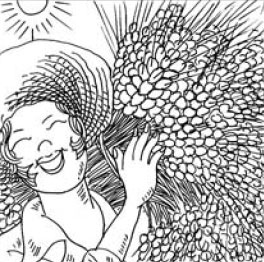
For a long period - the Chinese can hardly tell how long - the top person in charge of agricultural development often seemed the least charismatic member of a leadership team whether in the central cabinet or in a provincial government.
No one has ever had questions about this, for obviously, industry is more important for the nation's modernization. Just remember how, half a century ago, the Chinese would love others to look upon them as an industrial nation.
More recently, it is the financial matter that has been in the center of the media's limelight. Huge figures, complicated data, rapid fluctuations, widespread international impact, and the need for instant reactions have created a near-mystic halo around the financial leaders. Maybe they deserve this - if only they do their job right.
But at times, people should be reminded that agriculture is no longer a peasant job, and managing a nation's food supplies is as financially important as managing the banks.
Right now, as the world is ablaze with a new round of inflation driven by energy and food prices, anything that can be done to reduce its direct impact on an economy must be given due credit. If, at a time when energy prices, and the prices of all raw materials, are on the rapid rise, a nation can to a certain extent de-link the energy factor from its food supplies, its overall economy is more likely to remain better-off when all other economies in the world are plagued by the same problems.
China has little power to control the prices of energy and all other raw materials it needs. They mostly depend on imports - and more and more so.
So the only thing it can do is to try to come up with better and more stable food supplies. And at the moment, fortunately enough, China is doing OK in this aspect. Most importantly, despite the snow-storm in southern China and the earthquake in some of its western parts, China has reported a heartening summer harvest. That is a harvest of mainly wheat, or a stock food for human consumption, as the material for bread, pancakes and noodles.

This is based on the report that in 2007, when the global wheat price shot up an annualized 110 percent, China's wheat price edged up only 10 percent.
Agricultural Minister Sun Zhengcai recently announced that China had managed to increase its summer crop output for five consecutive years, this year being 120 million tons, if not more than that. In supply, that would mean 85 kilograms for each person in this nation.
Of course, that will not be entirely wheat, and in food processing, some weight of the crop will be lost. But so much supply - domestically created - is a good insurance. Its significance, translated in consumer market, could mean less fervent food inflation from the last few months of 2008 to the early few months of 2009.
That is good news for housewives. For the food price, as it is used in compiling the national inflation index, is regarded as the mother of all prices. Once the food price goes crazy, it would easily start a whole train of price changes.
If China is able to keep a relatively low food price level, it may continue to impress the world as one of the few emerging-market economies to guarantee to the investors less cost, or a slower cost increase.
Investors will begin to learn a lesson by then: it can be risky to always outsource to the land where the cost is the lowest without checking its protection from inflation and other financial upsets. An economy is attractive if it is able to keep its balance while others stumble.
E-mail: younuo@chinadaily.com.cn
(China Daily 06/30/2008 page4)

